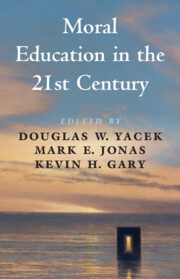Book contents
- Moral Education in the 21st Century
- Moral Education in the 21st Century
- Copyright page
- Contents
- Contributors
- Acknowledgments
- Chapter 1 Why Does Moral Education Matter in the 21st Century?
- Part I Historical Insights for Contemporary Moral Education
- Part II New Approaches to Moral Education
- Chapter 7 Liberal Authority and Moral Education
- Chapter 8 The Capability Approach as a Foundation for Moral Education
- Chapter 9 Recognition Theory and Moral Education
- Chapter 10 Practicing Care Ethics in the Current Context
- Chapter 11 A Non-Ideal Virtue Theory and the Centrality of Education
- Chapter 12 Pragmatist Moral Education
- Part III Responses to Contemporary Moral Problems
- Index
- References
Chapter 12 - Pragmatist Moral Education
from Part II - New Approaches to Moral Education
Published online by Cambridge University Press: 01 June 2023
- Moral Education in the 21st Century
- Moral Education in the 21st Century
- Copyright page
- Contents
- Contributors
- Acknowledgments
- Chapter 1 Why Does Moral Education Matter in the 21st Century?
- Part I Historical Insights for Contemporary Moral Education
- Part II New Approaches to Moral Education
- Chapter 7 Liberal Authority and Moral Education
- Chapter 8 The Capability Approach as a Foundation for Moral Education
- Chapter 9 Recognition Theory and Moral Education
- Chapter 10 Practicing Care Ethics in the Current Context
- Chapter 11 A Non-Ideal Virtue Theory and the Centrality of Education
- Chapter 12 Pragmatist Moral Education
- Part III Responses to Contemporary Moral Problems
- Index
- References
Summary
This chapter offers a real-world engagement with a pragmatist approach to moral education. In this, the work of this chapter proceeds across multiple subsections. First, the intellectual tradition of pragmatism is described in a historical and conceptual context. Having established the tradition’s bedrock commitments and relationships, the chapter turns its focus to morality. By tracing the general contours of morality for the pragmatist, the chapter connects pragmatist morality to more general pragmatist concerns, indicating how these relate to notions of education and growth. The chapter then focuses on pragmatist moral education, demonstrating ways it might engage with present-day concerns and frustrations. The chapter asserts that pragmatism provides a useful approach to addressing moral education in the contemporary time. Finally, the chapter concludes by considering and responding to potential hesitations regarding its offered analyses.
- Type
- Chapter
- Information
- Moral Education in the 21st Century , pp. 210 - 228Publisher: Cambridge University PressPrint publication year: 2023

